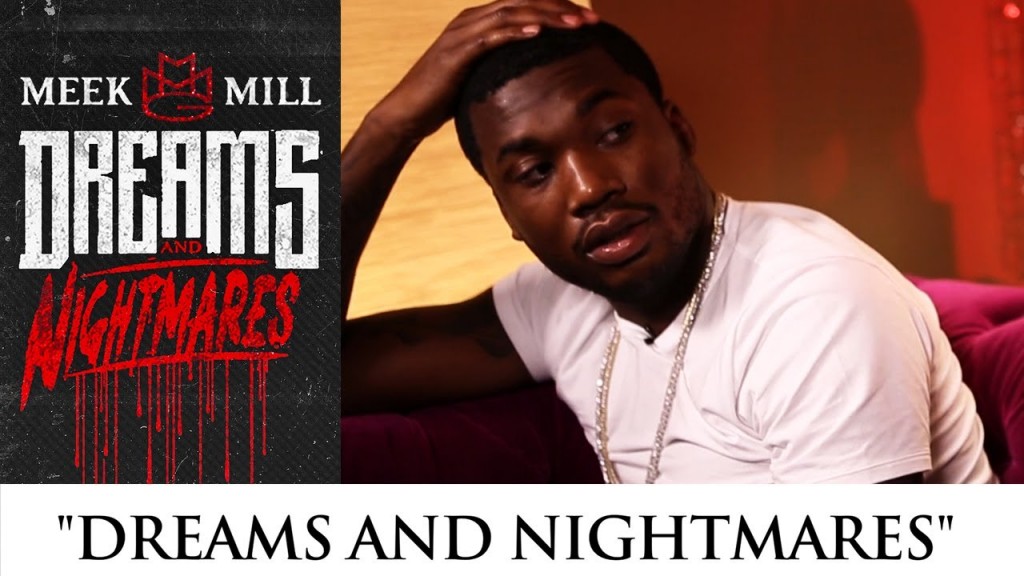

So after Meek Mill dropped his fire-filled mixtape Dreamchasers, his first with MMG (hosted by DJ Drama), in August 2011, expectations for his debut album were sky high. Taking the Lakers example a step further, expectations are what got Mike Brown fired on Friday.
Meek mills intro dreams and nightmares free#
However, history views that squad as a colossal failure because that team didn’t win a title with Shaq & Kobe in their primes, Karl Malone & Gary Payton as free agent acquisitions and Phil Jackson patrolling the sidelines. Lakers came within three wins of a championship.

Regardless of how good something may appear to be, the public’s perception of it may hinge heavily, or in some instances entirely, on the expectations attached to it from the beginning.įor instance, the 2004 L.A. Tale of the Tape: Expectations are a funny thing.

John Legend, Nas & Rick Ross), Amen (Feat Drake), Burn (Feat. Notable Fire: Real N***** Come First, Dreams And Nightmares, In God We Trust, Maybach Curtains (Feat. Trainer: Rick Ross (Maybach Music Group, Warner Bros.)Ĭut Men: Jahlil Beats, KeY Wane, All Star, Cardiak, Tommy Brown, Boi-1da, Tone the Beat Bully, The Black Metaphor, Lee Major, Kane Beatz, Ashanti Floyd, DJ Infamous, The Agency, Travis Sayles, Kenoe, Got Koke, The Renegades Dreams and Nightmares is the type of thing rap will always need, even when it's in flawed form*.Album/Mixtape Reviews Hip-Hop 0 Comments 50 views 0 Whether he can maintain or strengthen that in the future is an open question, but this is music that immediately hits emotionally and physically while lingering in your thoughts long after you turn it off. Still, Meek has made the move from mixtapes to the majors with a solid vision. Some songs that appear earlier on the album ("Maybach Curtains", "Young Kings") borrow the orchestral bloat of Rick Ross, and could've been replaced by up-tempo bangers à la "House Party" or "Burn" on which Meek has made his name. Blige, marks the point where the album becomes syrupy and maudlin. 2" is the follow-up to the stunning storytelling track from Dreamchasers, but this version lacks its precision and is bogged down by a chintzy Boi-1da beat. Unfortunately, the album loses steam with a quarter of the way to go. Where some rappers coast, Meek's mere existence feels earned. It extends to "Traumatized", a track where Meek addresses his father's killer while illustrating exactly how treacherous his upbringing was for him and those around him. He is as much a truth-teller as lyricist, and this singular viewpoint and delivery have both been carried over from his mixtapes. Struggle and triumph, are palpable and plainly articulated in his music, and it makes the best of Dreams and Nightmares (including "In God We Trust" and "Believe It") feel eminently vital. Sneering talking heads and confused elitists use that struggle as a weapon against the music: How can this music, and these artists, be taken seriously when they brag about throwing money at strippers? The genius of Meek's music is that he embodies, fleshes out, and answers the rapper's dilemma. Rap is often about contradiction, of wanting to stay humble and true while still stunting. It's a track that best distills Meek's singularity hurt oozes from his voice and words, illustrating rap's literal and spiritual roots. On the opening title track, he raps unabated for nearly four minutes, tracing lines from his come-up in Philly to strip clubs in Miami and back, over a beat that morphs into menace halfway through. His music channels pain, anger, empathy, and glee into a wave that hits immediately and forcefully, especially on the album's first two songs. It is tense and dramatic, with variations of piano constituting the bedrock of the album and Meek rapping passionately even by his own standards. After navigating that push-pull, Meek Mill has emerged with an album that is distinct in both voice and sound and also plays to his strengths. So maybe Dreams and Nightmares is something to celebrate, even though it's imperfect. But this is still a thin line for artists to walk, one so difficult that good-to-great major label rap debuts now feel like a minor miracle. Waka Flocka Flame was smart enough to capitalize on his timing simply by turning a proposed mixtape into a debut album, and, most recently, Kendrick Lamar used his unwavering artistic vision to essentially subvert this game entirely. Cole have made better, more accessible versions of the early songs that first got them buzz, and Nicki Minaj plays both sides of the field.


 0 kommentar(er)
0 kommentar(er)
